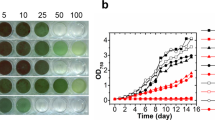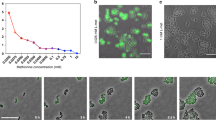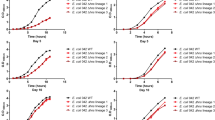Abstract
STRAINS of Salmonella typhimurium with a mutation in the hisT locus, produce an enzyme that cannot convert two uridine residues to pseudouridine in the anti-codon region of tRNAHis (refs 1 and 2). This mutation allows constitutive synthesis of the histidine biosynthetic enzymes1,3. Recently, hisT mutants were found to have changes in tRNALeu (refs 1, 4 and 5), in tRNAIle (ref. 6), and to be partially derepressed for the isoleucine–valine biosynthetic enzymes5,6. This suggests strongly that tRNA is part of the repression machinery for these enzymes. We report here that hisT strains are greatly limited in their ability to derepress the isoleucine–valine and leucine enzymes during leucine starvation. Thus, the hisT mutation alters regulation of these enzymes in two ways; it seems to cause a marked reduction in their maximal level as well as leading to a partial loss of repressibility.
This is a preview of subscription content, access via your institution
Access options
Subscribe to this journal
Receive 51 print issues and online access
$199.00 per year
only $3.90 per issue
Buy this article
- Purchase on Springer Link
- Instant access to full article PDF
Prices may be subject to local taxes which are calculated during checkout
Similar content being viewed by others
References
Singer, C. E., Smith, G. R., Cortese, R., and Ames, B. N., Nature new Biol., 238, 72–74 (1972).
Cortese, R., Kammeh, H. O., Spengler, S., and Ames, B. N., J. biol. Chem., 249, 1103–1108 (1974).
Lewis, J. A., and Ames, B. N., J. molec. Biol., 66, 131–142 (1972).
Allundeen, H. S., Yang, S. K., and Soll, D., FEBS Lett., 28, 205–208 (1972).
Rizzino, A. A., Bresalier, R. S., and Freundlich, M., J. Bact., 117, 449–455 (1974).
Cortese, R., Lendsberg, R., Vonder Haar, R. A., Umbarger, H. E., and Ames, B. N., Proc. natn. Acad. Sci. U.S.A., 71, 1857–1861 (1974).
Margolin, P., Genetics, 48, 441–457 (1963).
Roth, J. R., and Hartmann, P. E., Virology, 27, 297–307 (1965).
Lewis, J. A., and Ames, B. N., J. molec. Biol., 66, 131–142 (1972).
Friedberg, D., Mikulka, T. W., Jones, J., and Calvo, J. M., J. Bact., 118, 942–951 (1974).
Freundlich, M., Trela, J., and Peng, W., J. Bact., 108, 951–953 (1971).
Kelmers, A. D., and Heatherly, D. E., Anal. Biochem., 44, 486–495 (1971).
Blatt, J. M., Pledger, W. J., Umbarger, H. E., Biochem. biophys. Res. Commun., 48, 444–450 (1972).
O'Neill, J. P., and Freundlich, M., Biochem. biophys. Res. Commun., 48, 437–443 (1972).
Author information
Authors and Affiliations
Rights and permissions
About this article
Cite this article
BRESALIER, R., RIZZINO, A. & FREUNDLICH, M. Reduced maximal levels of derepression of the isoleucine–valine and leucine enzymes in his T mutants of Salmonella typhimurium. Nature 253, 279–280 (1975). https://doi.org/10.1038/253279a0
Received:
Revised:
Issue Date:
DOI: https://doi.org/10.1038/253279a0
This article is cited by
-
Effect of mutations affecting lysyl-tRNALys on the regulation of lysine biosynthesis in Escherichia coli
Molecular and General Genetics MGG (1978)
-
Correlation between the serine sensitivity and the derepressibility of the ilv genes in Escherichia coli relA −mutants
Molecular and General Genetics MGG (1978)
-
Detection of messenger RNA from the isoleucine-valine operons of Salmonella typhimurium by heterologous DNA-RNA hybridization: Involvement of transfer RNA in transcriptional repression
Molecular and General Genetics MGG (1977)
Comments
By submitting a comment you agree to abide by our Terms and Community Guidelines. If you find something abusive or that does not comply with our terms or guidelines please flag it as inappropriate.



